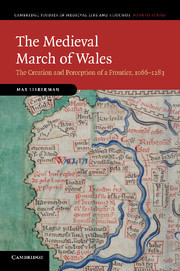Description
The Medieval March of Wales
The Creation and Perception of a Frontier, 1066–1283
Cambridge Studies in Medieval Life and Thought: Fourth Series
Author: Lieberman Max
This study of the creation and the changing perception of a medieval borderland makes a significant contribution to frontier studies.
Language: English
Subject for The Medieval March of Wales:
Approximative price 32.87 €
In Print (Delivery period: 14 days).
Add to cart
The Medieval March of Wales
Publication date: 01-2014
Support: Print on demand
Publication date: 01-2014
Support: Print on demand
Approximative price 94.48 €
In Print (Delivery period: 14 days).
Add to cart
The medieval march of wales: the creation and perception of a frontier, 1066â1283
Publication date: 01-2010
308 p. · 15.8x23.5 cm · Hardback
Publication date: 01-2010
308 p. · 15.8x23.5 cm · Hardback
Description
/li>Contents
/li>Biography
/li>
This book examines the making of the March of Wales and the crucial role its lords played in the politics of medieval Britain between the Norman conquest of England of 1066 and the English conquest of Wales in 1283. Max Lieberman argues that the Welsh borders of Shropshire, which were first, from c.1165, referred to as Marchia Wallie, provide a paradigm for the creation of the March. He reassesses the role of William the Conqueror's tenurial settlement in the making of the March and sheds new light on the ways in which seigneurial administrations worked in a cross-cultural context. Finally, he explains why, from c.1300, the March of Wales included the conquest territories in south Wales as well as the highly autonomous border lordships. This book makes a significant and original contribution to frontier studies, investigating both the creation and the changing perception of a medieval borderland.
Introduction; 1. A border region?; 2. The making of a border aristocracy; 3. Warfare and diplomacy; 4. The extent and nature of the military frontier; 5. The militarization of society; 6. The shaping of administrative territories; 7. The border lordships and the English state; Conclusion.
Max Lieberman is a Research Fellow in Medieval History at Wolfson College, Cambridge, and an Honorary Research Associate at the Department of Anglo-Saxon, Norse and Celtic in the University of Cambridge.
© 2024 LAVOISIER S.A.S.
These books may interest you

The English Church, 940-1154 160.25 €



